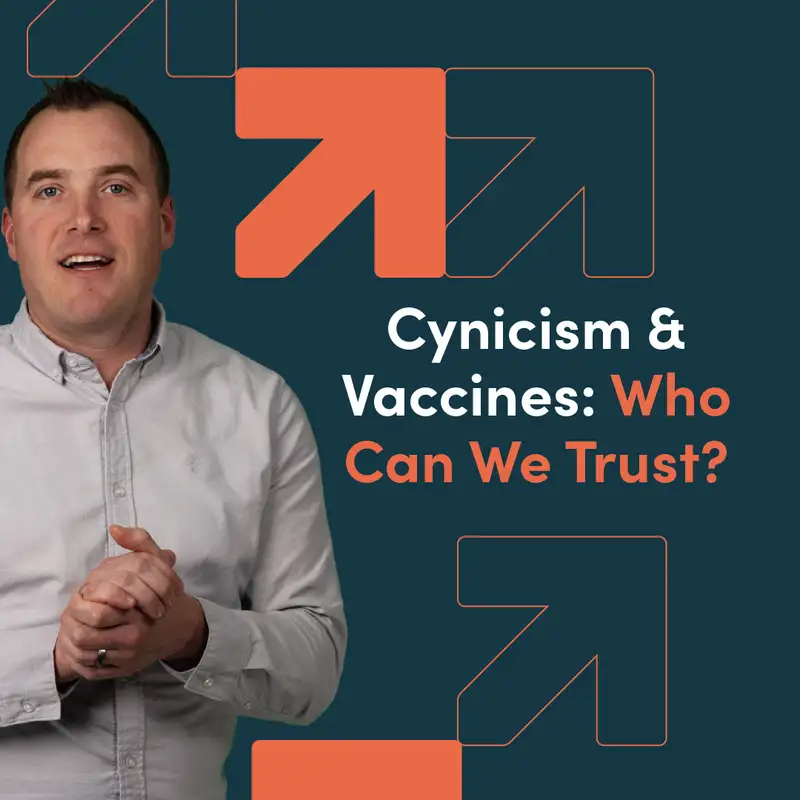Cynicism & Vaccines: Who Can We Trust?
Hello, everyone. Thanks for listening to Wake Up, Look Up, a podcast where we connect events happening in real time to the gospel of Jesus Christ. I'm Zach Weihrauch. And in today's episode, we're talking about cynicism and vaccines, and we're asking, who can we trust? This is prompted by a op ed in the Washington Post by Monica Hesse.
And she was pushing back on Robert Kennedy junior, our health and human services secretary, use of the phrase, do your own research. This is a phrase that Kennedy loves to use when asked about his controversial opinions on things like vaccines. Someone says, secretary Kennedy, should I get my children vaccinated? And his answer is, do your own research, which, of course, is another way of saying, don't just listen to what science says or doctors say. Think about it for yourself.
This phrase, do your own research, can seem innocuous. Like, after all, we do wanna think for ourselves. Right? We do want to be informed and understand why we would pursue any course of action. But there are some problems with the phrase.
For one, it's deeply rooted historically in conspiracy theories. See, for example, Milton William Cooper, who used the phrase to provoke a variety of conspiracies. I could say, for example, president Trump is really an alien, not a human. That is not a view I hold. But I could say when someone says, how do you know that?
I could just look at them with a twinkle in my eye and say, do your own research. Of course, in the day of the Internet, I think it's entirely possible you could find a website that's arguing that president Trump is an alien. Does that count as research? That butts up against that other problem with the phrase, not just that historically it was used by conspiracy theorists, but also that it presupposes I know how to do that research. Of course, there are people, for example, in medicine who will spend a decade or more studying medicine.
They will know science. They will have earned degrees, written peer peer reviewed articles, have actually spent time in a lab. If I spend a couple days on Reddit, is that the same thing? So I'm doing my own research, but is it as legitimate as the research of a medical researcher? The problem here is that we're trying to balance skepticism and truth because the phrase do your own research does hook into us a little bit because every one of us have been lied to.
We probably also have seen a doctor who told us to do something that didn't work, maybe even made it worse. And so when someone suggests that maybe every doctor we know doesn't know what they say they know, we believe a little bit of that, but it also weakens my understanding and appreciation for experts and truth. So as Christians, what should we do with the phrase do your own research as it relates to vaccines or anything else? Well, let me try to offer some guidance. The first is that truth really does matter for leaders.
James three says that we should be careful about stepping into leadership because we will answer to God for every word that comes out of our mouth. Truth mattering for leaders, though, means two things. One is leaders should only say what they know to be true. So if secretary Kennedy thinks you shouldn't vaccinate your children, I'd actually rather hear him say that and defend it than deal in the ambiguity of saying do your own research, which is neither an opinion or a fact. But, also, the reason we are so driven towards conspiratorial thinking is because our leaders tend to be liars, and that's the real issue here.
We should be raising the bar for leaders. We should be unwilling to vote for and support liars. That should be a key issue because until we get to the point where we feel as though we can trust our leaders, phrases like do your own research are going to, in some ways, rightfully hook into our hearts. Misleading people is spiritually dangerous. See Proverbs twelve twenty two.
Misinformation can ruin a family. It can ruin a life. It can ruin a society. Also, eroding trust leads to cynicism. I think this is what you see in Ecclesiastes one, by the way, where Solomon is growing increasingly disillusioned with his society and his culture and even with himself, and he's no longer interested in much of anything.
But let me just add this. When you're thinking about whether or not to get vaccinated or when you're thinking about what to do with your kids or any issue where those in in who are experts seem to be saying one thing, and there are other people over here saying do your own research, Let me just tell you this. The reason we struggle to trust people is very simply, I believe, a spiritual issue, and that spiritual issue is projection. Deep down, each one of us knows that in our hearts and in our minds, we practice deception. We practice deception with other people.
We practice deception with ourselves. And because we know that we can't trust ourselves, because we agree with Jeremiah who said in Jeremiah 17, the heart is desperately wicked. Who can heal it? We know that's true. We assume other people are going to be lying.
So, actually, the first step of restoring trust in other people is to have integrity for ourselves, to tell the truth ourselves, to begin to believe that it is possible to live in the world and be a truth teller. This is exactly what Paul calls calls us to in Ephesians four verse 25. Who can we trust? The answer, I think, is no one until we believe ourselves to be trustworthy, and only Jesus can help us get there. Hey.
Thanks for watching this episode of Wake Up, Look Up. If you enjoyed it, please help us get the word out by sharing it with someone you think might benefit from it. And while you're here, make sure to subscribe to our YouTube channel to get further content or even download the CCC app where you'll find even more resources to help you grow in your faith and relationship with Jesus Christ.
Have an article you’d like Zach to discuss? Email us at wakeup@ccchapel.com!
Creators and Guests


